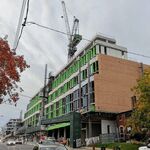Investors fight to back out of Trump tower
Trump woes could have serious implications for Toronto’s overheated condo market.
You can view this story at:
http://www.thestar.com/business/article/1103497--investors-fight-to-back-out-of-trump-tower
what surprised me was the following:
'Recently a U.S. buyer — citing two years of delays in the 60-storey project and “financial difficulties” — won the right from the Ontario Court of Appeal to renege on his $709,000 condo/hotel suite purchase at the landmark Bay and Adelaide property.'
the decision:
http://irvinschein.com/2011/11/22/d...dominium-units-how-long-is-too-long/#more-391
On November 8, 2011, the Ontario Court of Appeal released its decision in the case of Schneeberg v. Talon International Development Inc. (2011 ONCA 687), a case involving the sale of a condominium unit to be built in the Trump International Towers development in downtown Toronto, Ontario.
Mr. Schneeberg bought the unit to be built under an agreement made in 2004. The agreement provided that the closing would take place on March 20, 2009, assuming that it was ready for occupancy. It was not ready on that date, and the vendor attempted to unilaterally extend the closing date to give itself more time to finish it. Eventually, Mr. Schneeberg decided to terminate the transaction and brought an application to the court for the return of his deposits. The application judge granted that relief, and the vendor appealed to the Court of Appeal.
Purchasers must be given some reasonable opportunity to terminate transactions if delays are excessive.
The fact that newly constructed condominium units are frequently not ready for occupancy on the date originally contemplated by the parties and reflected in the Agreement of Purchase and Sale is well known to anyone who has ever been involved in this type of transaction. The Court of Appeal made the following observations:
“There is no dispute over the fact that purchases and sales of condominiums are commercial transactions within an industry uniquely plagued by delays. These delays are caused by the market, as the sale of units in a new development dictates the availability of financing, by the vagaries in the construction process, and by the complexities associated with the registration process required by the Condominium Act. Delays in the closing of condominium units are expected. They are part of the business of developing condominium projects and, it follows, part of purchasing a newly-constructed unit.”
It makes some sense to think that someone purchasing a unit for investment might well be able to tolerate closing date extensions of some or perhaps any length. Someone purchasing the unit to live in it may not have the same tolerance level. Considerations such as the sale of one’s existing residence, for example, can be highly relevant. Lengthy unilateral extensions of the closing date by a vendor who has not been able to get the building built and the unit ready for occupancy can create havoc for a purchaser who is also an end-user.
Nevertheless, vendors will inevitably attempt to include in their standard form of Agreement of Purchase and Sale rights to extend the closing date unilaterally in order to accommodate construction and development delays. Indeed, this is one of the provisions which any purchaser must review with his or her lawyer before finalizing the commitment to purchase a unit to be constructed. In this case, a poorly draft agreement proved to be the vendor’s downfall.
The application judge reviewed the agreement with a fine-tooth comb and concluded that notwithstanding what the vendor may have assumed to be boiler-plate provisions permitting it to unilaterally extend the closing date indefinitely, no such provisions actually existed. The Court of Appeal reviewed the same provisions and agreed. The appeal judges pointed out that while the agreement contained a variety of provisions clearly contemplating such a right of extension to exist, no one provision specifically gave the vendor to unilaterally extend the closing date, either as a result of the unit not being ready for occupancy or for any other reason.
The closest that the vendor could get was the provision that said that the purchaser would take occupancy on March 20, 2009 “or such extended accelerated date pursuant to the terms hereof that the Unit is substantially completed …”. In the Court of Appeal, the vendor argued that this provision contemplated that the closing date would be extended until the unit was substantially completed.
The Court of Appeal disagreed, pointing out that while this clause contemplated an extended date “pursuant to the terms hereof”, no such terms actually existed anywhere else in the Agreement. This gap was enough to allow Mr. Schneeberg to terminate the transaction.
In reaching its conclusion, the Court also made the following interesting statement:
“Against this background, it is quite understandable that the parties expressed their accord in such a way as to contemplate extensions to the closing date. However, it would be absurd to interpret the Agreement as giving the Vendor the right to extend closing on a basis that is not only unilateral, but also unlimited. Among other problems, such a right would be open to manipulation and abuse.”
While the Court was discussing this particular agreement in making the statement, in my view, it clearly points to a judicial disinclination to enforce agreements which seem to give a vendor an unlimited right to closing date extensions. Simply put, purchasers must be given some reasonable opportunity to terminate transactions if delays are excessive.
While typical purchase agreements may not be drafted as poorly as this one appears to have been, I think that this decision suggests that in a case of patently unreasonable delays, a court may be willing to stretch to find some basis upon which to allow a purchaser out of the deal.




